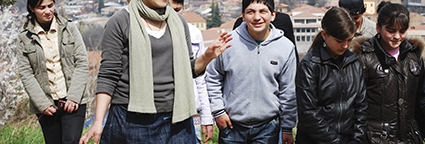Akhalgori: Awaiting First Bell as the School Language is Switched
Op-ed
Like Gali, teaching in the Georgian language is to be prohibited in eight Georgian schools on the occupied South Ossetian territory of Akhalgori starting this autumn. From September 15, Georgian first graders there will get the Russian “Azbuka” instead of “Dedaena” and Georgian textbooks will gradually be replaced by Russian in the higher classes. The language of instruction will change in Georgian nursery schools, too. Moreover, the school teachers who are unable to get “certification” in Russian will lose their jobs. Principals and teachers from the Georgian schools in Akhalgori have already been invited for certification in Tskhinvali.
There were three public schools in Akhalgori before the August 2008 war: two Georgian and one Russia-Ossetian. One of the first is already closed and serves as a place of residence for the Russian military. About 70 pupils living in the area go to the one that remained and which has been divided by the Ossetian administration into Georgian and Russian sectors. The number of nursery schools has also diminished, with only two Georgian-language nurseries with about 30 children left after August 2008. Ten pupils of these two were supposed to start school this year; naturally they know neither Russian nor Ossetian, and therefore it is unclear how the teachers from Tskhinvali will be able to communicate with them. Akhalgorians say their children will join those who are studying in the Tserovani IDP settlement.
This educational “reform” is a debut move by the newly appointed so-called South Ossetian President Anatoliy Bibilov. Like the so-called President of Abkhazia, the other occupied territory, Raul Khajimba, the former is also working hard to “disappear” the Georgian language from the educational scene. In May, when Bibilov visited Akhalgori, he ordered two tasks to be done. One was to lodge Ossetians in those houses in which Georgians had not lived on a permanent basis in the last five years. And another - to replace the Georgian language of instruction with Russian and to leave Georgian as a taught subject. Bibilov said that schools should become part of the united educational system of the “Republic,” thus making it necessary to stop teaching in Georgian and using Georgian textbooks. The so-called Ministry of Education was quick to act in response to the orders given by the “President”.
“The ‘Russification’ of schools in Akhalgori aims at forcing Georgians to leave the territory,” said Mamuka Areshidze, Head of the Caucasus Centre for Strategic Studies. “Earlier, Bibilov said that the ‘system of State Security’ of South Ossetia should be strengthened and that in this sense Georgians residing Akhalgori were a big problem. There’s not much we can do about it, other than have Official Tbilisi talking loudly in the international arena about the fact that people are forbidden to learn in their own mother tongue”.
Despite the acute statement of the leaders of both breakaway regions, the number of youth coming to Georgia to study is rising and the reason is simple: the quality of education is very low there. Over recent years, Abkhazia has seen an unprecedented increase in the number of young drug users, and their parents are doing everything they can to send them away; in this unresolvable situation as they say, “let it be even Georgia, where the quality of education is high...” Moreover, most families from Abkhazia and Ossetia can’t afford to send their children to the qualified Russian educational institutions, or to get adequate medical treatment: they say that the only answer is “Georgia”, where they are able to visit with the help of Georgians living on the “borderline”.
The latest decision was made by their “heads” to strengthen mutual trust with Russia, though Russia is depriving the population of the chance to develop.
To everyone’s surprise, Bibilov’s “presidential” decision turned out to be unacceptable to a number of Russian experts. Political analyst Nikolai Silaev believes that the planned novelties will prove a great mistake for the de-facto government of the Tskhinvali region: “If there are enough people used to learning in the Georgian language, and think of themselves as Georgians, and of Georgian language as their mother tongue, it is unclear why they decided to forcibly replace the language of instruction with Russian. This will reflect on the image of South Ossetia and the attitude of the international community towards it. Even considering that the republic is not recognized, they do watch the situation in the region closely, also examining the attitude of these two non-recognized new states towards national minorities. The challenge of Tskhinvalian politicians is to be able to integrate Georgian minorities. Whether the Tskhinvali government will be able to do so is one of the most important criteria for a successful state,” he told an Ekho Kavkaza journalist.
Whether the position showed by the Russian expert coincides with that of Official Kremlin is hard to say, and a few weeks are left until the start of the new academic year when everything, including if this educational “reform” was that of Bibilov or of Kremlin, will most likely become clear when the first bell rings.
Zaza Jgarkava












